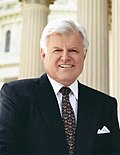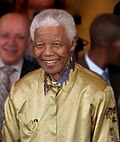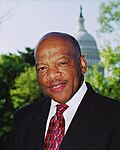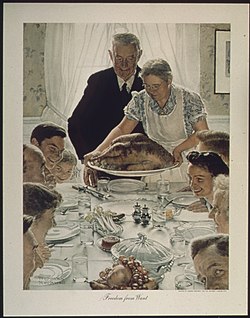| Four Freedoms Award | |
|---|---|
 President Franklin Delano Roosevelt, painted by Francis Owen Salisbury, 1947 | |
| Country | United States |
| Established | 1982 |
| Ribbon of the award | |
The Four Freedoms Award is an annual award presented to "those men and women whose achievements have demonstrated a commitment to those principles which US President Franklin Delano Roosevelt proclaimed in his Four Freedoms speech to the United States Congress on January 6, 1941, as essential to democracy: "freedom of speech and expression, freedom of worship, freedom from want, freedom from fear". The annual award is handed out in alternate years in New York City by the Roosevelt Institute to Americans and in Middelburg, Netherlands, by the Roosevelt Stichting to non-Americans.

































